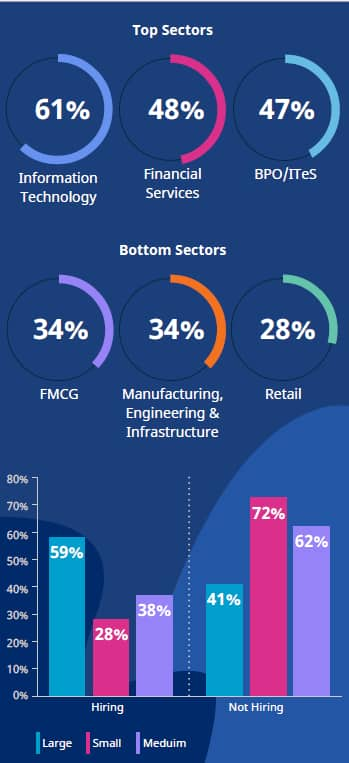Representative image
Hiring in India saw a 11 percent quarter-on-quarter (QoQ) growth in June quarter (Q1), according to the Indeed India Hiring Tracker.
The survey showed that standout growth was seen in sectors like in information technology (61 percent), financial services (48 percent), and BPO/ITeS (47 percent) as the job market begins showing signs of recovery from the COVID-19 second wave.
This survey was conducted by Valuevox on behalf of Indeed among 1,500 employees and 1,200 businesses across 9 cities in the month June 2021.
Large businesses continued to dominate hiring activity (59 percent of opportunities), while hiring by mid-sized businesses saw a decline (38 percent).
Overall, fewer surveyed employers were hiring between April-June compared to the previous quarter (42 percent vs 64 percent) with Bangalore continuing to lead hiring (56 percent) and Kolkata replacing Chennai at the bottom of the hiring list (34 percent).

The survey showed that receding COVID-19 cases and partial lockdowns in Q1FY allowed businesses to operate, focussing employers on roles driving sales and revenue, a shift from the focus on operational roles to stabilise business operations in Q4FY21.
Roles such as sales coordinator (83 percent of all employer respondents), relationship manager (77 percent), digital marketer (69 percent), UI/UX (61 percent), designer, and quality analyst (53 percent) were the most in demand.
Sashi Kumar, Head of Sales, Indeed India said, "With hiring activity seeing a month-on-month increase, it was interesting to see businesses pivot their hiring priorities from operation roles to sales roles."
Mental health and employee development challenges
The widespread impacts of the second wave resulted in under-staffed teams and increased employee burnout.
However, 76 percent of the jobseekers surveyed did not receive COVID-19-related benefits/compensation packages or mental health support.
Appraisal plans were also impacted. The survey said that 70 percent of employees said that they did not receive any promotion or pay increase this quarter. Here, only 11 percent of employers promoting or offering salary increases.
Mismatched return-to-office expectations
Employers and employees aren’t on the same page when it comes to future work models.
The survey said that employers preferred a hybrid work model (42 percent) to remote work (35 percent), while jobseekers favoured remote working (46 percent) over a hybrid approach (29 percent).
Further, 51 percent of women compared to 29 percent of men said they wanted to continue working from home.
Changing jobseeker aspirations
The number of job seekers and job changers increased slightly over the previous quarter at 70 percent versus 68 percent QoQ. Job-seeker priorities also shifted, with 25 percent saying salary was their primary focus , followed by career growth (19 percent), learning opportunities/challenges/responsibilities (16 percent), and company reputation (14 percent).
Startup-SME jobs were the top picks for post-graduates (44 percent) and mid-level job seekers (42 percent).